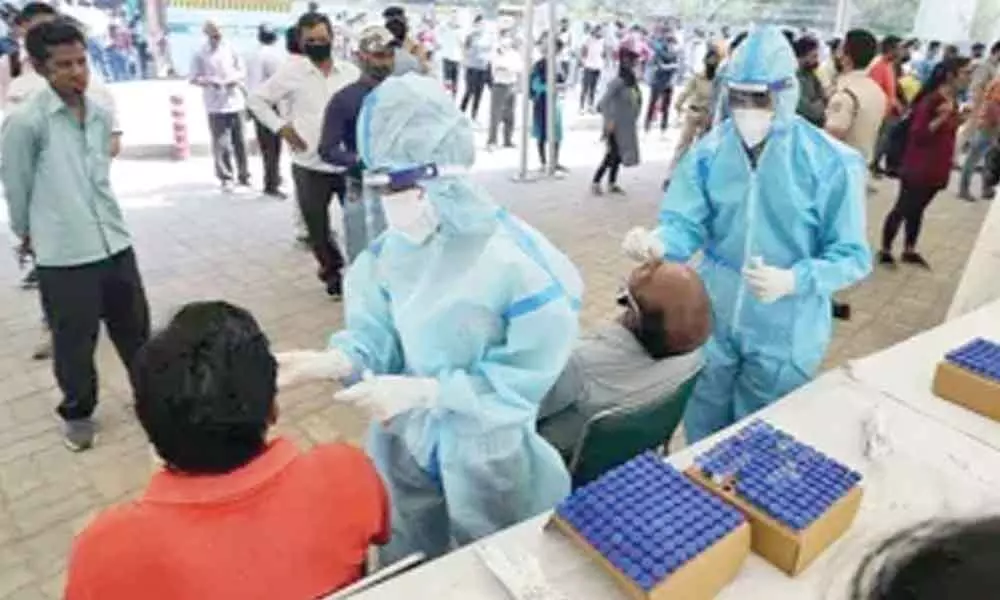Live
- Vedamrit Honey’ launched
- Arjun Das Brings Mufasa to Life in Tamil
- Odisha move to prepare maritime perspective plan
- Jal Jeevan Mission empowering women in rural areas: PM Modi
- Pradhan urges Nadda to set up pharmacy unit in Odisha
- Assembly winter session ends ahead of schedule
- Nepali Army Chief General Ashok Raj Sigdel Strengthens Ties With India In Four-Day Visit
- BRS MLAs, MLCs Skip Second Day of Orientation Classes
- Andhra Pradesh Student Dies in Tragic Car Crash in Leicestershire, 4 Others Injured
- Oppn assails delinking of Waltair div from ECoR
Just In
Karnataka government sets up ward panels, decentralises Covid management


Muddle-headed approach of Telangana Government
Bengaluru: Taking a cue from the Brihanmumbai Municipal Corporation (BMC)'s success in tackling the second wave of Covid, the State government issued...
Bengaluru: Taking a cue from the Brihanmumbai Municipal Corporation (BMC)'s success in tackling the second wave of Covid, the State government issued directives to set up Ward Decentralised Triage and Emergency Response (DETER) Committees for Covid management in all 198 wards in Bengaluru based on the Mumbai model.
These WDC committees will be a synergy of BBMP officials, ward committee members, government officials, peoples representatives, volunteer RWAs, civil society organisations and disaster support initiatives. This will help in the decentralization and better supervision of Covid management at ward level. Open source technology platforms will be utilised to operationalise WDC functioning, and a suitable online platform will be used by BBMP to support this.
"This will help in the decentralisation and provide better supervision for ward-level Covid governance," read the directives issued by revenue department's principal secretary, N. Manjunath Prasad.
All the 198 Ward DETER Committees (WDCs) of BBMP will be entrusted with various activities in order to decentralize civic body's efforts and reach all the citizens, especially vulnerable communities that do not have access to health care or information to avail health care services. WDCs will be headed by the ward nodal officer who will be the chairperson of the committee. In addition to the existing ward committee members, the WDCs will comprise other government officials, RWAs and volunteers.
WDCs will now act as Ward Disaster Management Cells (WDMC). The Ward Engineer/Health Inspector/ Revenue Inspector has been designated as Secretary of WDC.
One of the key objectives of WDC is to become the first point of contact for persons with Covid infection in each ward and provide timely and accurate information to citizens on appropriate actions and behaviours at each stage of the Covid lifecycle.
The volunteers and committee members from the WDC should meet heads of the hospitals or CEOs as the case may be to understand the constraints.
The officials should be informed not to trouble the doctors and management. Volunteers need to work with the hospitals to help the Aarogya Mitras and ensure that oxygen supplies and other resources reach the hospital. The volunteers should work with each hospital in shifts
and coordinate with the community triage centres. They have to refer people to get ICU admission when they get worse and help in discharge when saturation reaches 96%.
Resident groups and CSOs will have to play a critical role in making ward committees functional. The first responsibility is to review this document and suggest changes to improve the process.
All organizations working in the COVID relief efforts or even otherwise are requested to join the WDC to strengthen ward-level COVID management efforts.

© 2024 Hyderabad Media House Limited/The Hans India. All rights reserved. Powered by hocalwire.com






